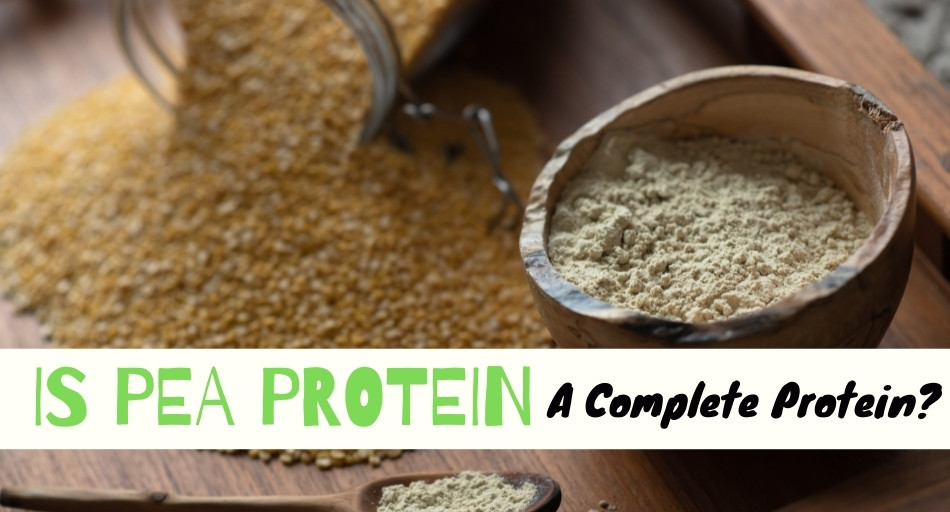A good amount of protein will help with your muscle growth. When you combine a variety of plant proteins, it will help you to get the right amount of amino acids.

Today, we're putting pea protein under the spotlight. Is pea protein a complete protein?
Table of Contents
Is Pea Protein a Complete Protein?
Pea protein is considered to be a complete protein. Unlike beans or rice, it contains all of the essential amino acids that you need to stay healthy.
Also, if you're allergic to soy or whey, a pea can be a good alternative to other sources of protein. We all know that if we want to be healthy, our diet must consist of a wide variety of healthy foods.
Is Pea Protein Healthy?
Pea protein is a good way of getting protein from a plant-based diet. Whole foods are recommended rather than taking supplements.
But if you're an athlete, you need more protein. That's when taking protein supplements will be a better option for you.
Fresh peas can provide a good amount of fiber, folate, thiamine, vitamins A, C, and K as well as manganese.
A cup of green peas, contains 8.6 grams of protein. Protein powders can obviously provide more protein than fresh peas. To get the same amount of protein, you need to eat a lot of peas. Using pea protein powder is a good idea.
Pea is also considered a low bioavailable source of protein. Your body can only absorb a small amount of protein from peas than other protein sources around. However, it's easier to digest compared to whey.
This is my favorite pea protein powder because it has no surplus ingredients. Check the price on Amazon (affiliate link)
Some studies suggest that pea protein contains anti-inflammatory, antihypertensive, and antioxidant properties.
These properties will help your cholesterol levels go down to avoid diseases. Pea protein is a versatile protein source since it has a mild flavor.
Why is Pea Protein a Complete Protein?
Pea protein can come generally from green and yellow peas. You can add it to different foods such as cereals, energy bars, veggie burgers, and other meal replacements. If you have food allergies, pea protein is a good option.
Pea protein is considered a complete protein since they contain all the essential amino acids. However, it's still a good idea to combine it with other protein sources.
It will help to provide you with the protein your body needs to stay healthy.
How Can You Get the Most Out of the Protein in Pea?
Pea is already considered a complete protein but there are some combinations that you can try. Add legumes to grains, nuts, seeds, dairy products, and other vegetable protein.
You can also get the protein you need from different veggies. That's why there is no need to worry about being vegetarian.
However, if you're a meat-eater, you can get more protein than vegetarians. Eggs and milk are more efficient protein sources compared to meat, poultry, or fish.
Another good choice of non-GMO pea protein with no excess ingredients.
Pea protein can provide an amount of protein which is the same as meat. When you add legumes to your diet, it means you can get enough protein even if you don't eat meat.
Try to add a cup of soybeans which contains about 20 grams of protein. The protein from soybeans is equal to eating 3 hotdogs, 3 eight-ounce cups of milk, a quarter pounder burger, or 3 ounces of cheese.
Why not add some pea protein powder with grains like a cup of whole-grain rice. It will help you to absorb more protein that way.
Combining them will add essential amino acids that you need to have for your diet. If you plan to eat a cup of black-eyed eyed peas, combine it with a cup of brown rice to have 10 grams of protein.
If you want to get a high quality plant protein, make sure to also have the essential amino acids. Pea protein has 30% of these amino acids. If you compare it with soy protein, it only has 27%.
Brown rice protein is at 28% and combining them will increase the amount of protein for your diet.
What is the Complete Amino Acid Profile of Pea Protein?
Pea protein contains the essential amino acids that can be found in a complete protein. The only issue is that the methionine or cysteine content is lower than that of a complete protein. Check out the essential amino acids and the comparison of a complete protein from pea protein.
| Amino Acid | Complete Protein | Pea Protein |
|---|---|---|
| Histidine | 1.8 | 2.5 |
| Isoleucine | 2.5 | 4.8 |
| Leucine | 5.5 | 8.5 |
| Lysine | 5.1 | 7.5 |
| Methionine+Cysteine | 2.5 | 1.9 |
| Phenylalanine+Tyrosine | 4.7 | 5.5 |
| Threonine | 2.7 | 3.7 |
| Tryptophan | 0.7 | 1 |
| Valine | 3.2 | 5 |
Conclusion
Pea protein is a complete protein since it contains all the nine essential amino acids. It's a healthy type of plant-based protein and will help you to build more muscles.
It can also aid you in maintaining your blood sugar levels and blood fats. Pea protein will also keep your appetite under control and help you stick with eating a balanced diet.
Adding pea protein powder is a good option for people who have gut issues. Pea protein comes from plants and has anti-inflammatory and antioxidants properties.
So, make sure to add pea protein and other plant-based protein sources to keep you healthy and stay in shape.


